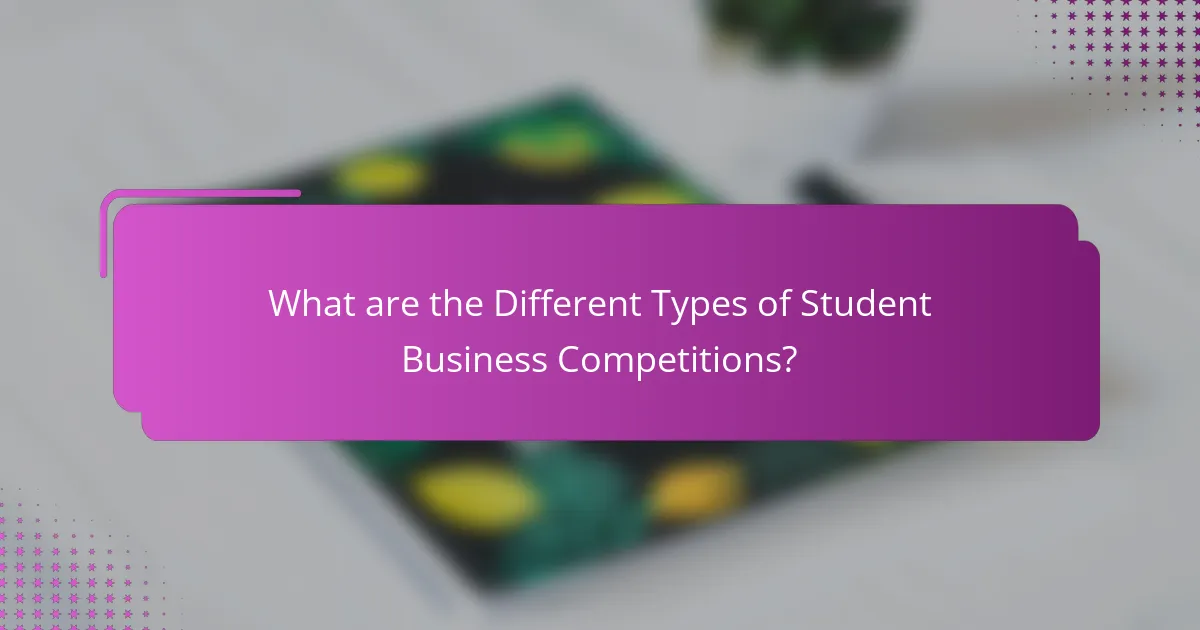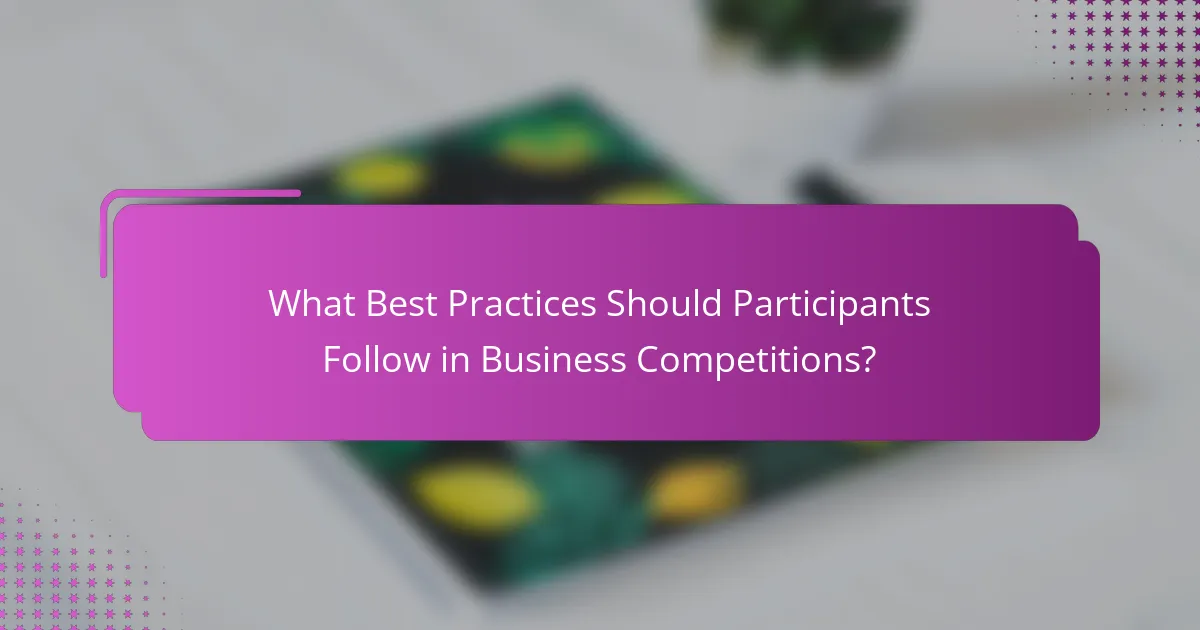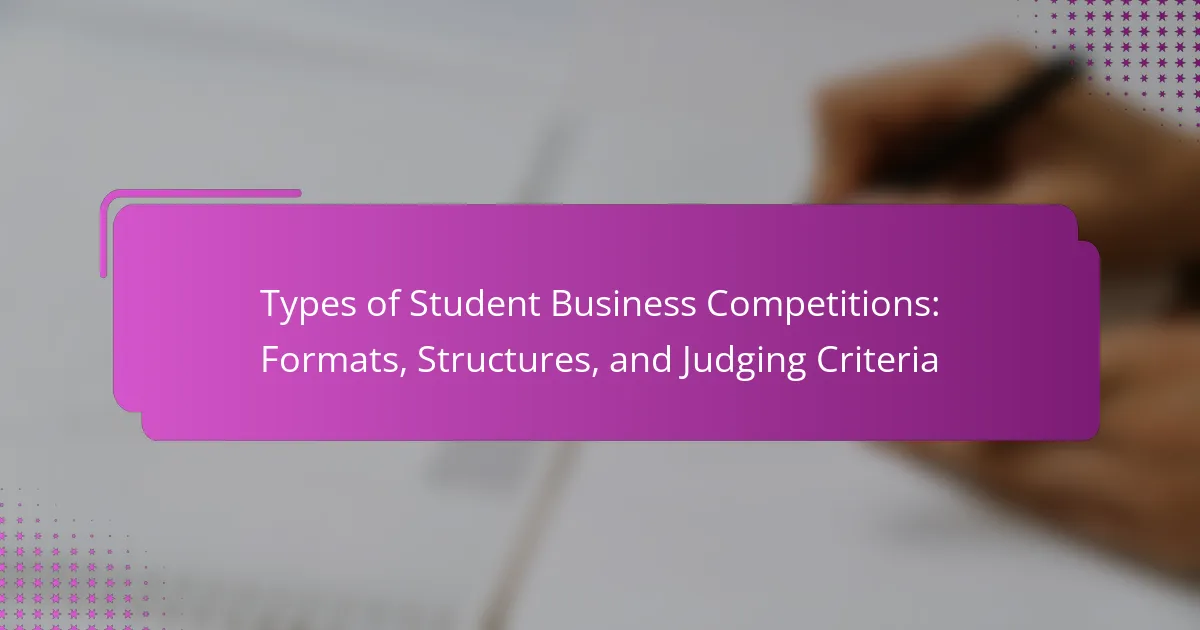Student business competitions encompass various formats, including business plan competitions, case competitions, pitch competitions, and simulation competitions, each with distinct structures and judging criteria. Business plan competitions require participants to create detailed business plans, while case competitions focus on solving real-world business issues. Pitch competitions emphasize presenting business ideas to investors, and simulation competitions involve managing a virtual company. The design of these competitions significantly affects participant engagement, satisfaction, and performance, with clear rules and structured formats leading to better outcomes. Understanding the competition’s requirements, managing time effectively, and fostering team collaboration are essential for success in these competitions.

What are the Different Types of Student Business Competitions?
Student business competitions vary widely in format and structure. They typically include business plan competitions, case competitions, pitch competitions, and simulation competitions. Business plan competitions require students to develop a comprehensive business plan and present it to judges. Case competitions involve analyzing a real-world business problem and proposing solutions. Pitch competitions focus on delivering a concise business idea to potential investors. Simulation competitions allow students to manage a virtual company and make strategic decisions. Each type has specific judging criteria, often evaluating innovation, feasibility, and presentation skills.
How do these competitions vary in format?
Competitions vary in format based on structure and judging criteria. Some competitions are case study-based, where participants analyze a business scenario. Others may focus on pitch presentations, requiring teams to present their business ideas to judges. Hackathon formats encourage rapid development of solutions within a set time frame. Additionally, some competitions involve simulations, where participants manage virtual companies. Each format influences the skills emphasized, such as analytical thinking or public speaking. For instance, pitch competitions prioritize communication skills, while case studies focus on strategic analysis. The diversity in formats caters to different learning objectives and participant strengths.
What are the most common formats used in student business competitions?
The most common formats used in student business competitions include case competitions, pitch competitions, and simulation competitions. Case competitions involve teams analyzing a business problem and presenting solutions. Pitch competitions require participants to present their business ideas to judges in a limited time. Simulation competitions use computer-based scenarios to test decision-making skills in a business environment. These formats are widely adopted due to their ability to assess practical skills and foster teamwork.
How do team-based competitions differ from individual competitions?
Team-based competitions involve collaboration among multiple participants, while individual competitions focus on the performance of a single competitor. In team-based competitions, success depends on the collective efforts and skills of the group. Participants must communicate and strategize to achieve a common goal. This format often fosters teamwork and enhances interpersonal skills. Conversely, individual competitions emphasize personal achievement and accountability. Each competitor’s results are solely based on their abilities and decisions. Research indicates that team-based competitions can lead to higher engagement levels among participants, as seen in studies on collaborative learning environments. Individual competitions may cultivate self-reliance and personal growth, as competitors must rely on their own knowledge and skills.
What structures do student business competitions typically follow?
Student business competitions typically follow a structured format that includes several key components. These competitions usually begin with an application or registration phase where teams submit their proposals. Following this, there is often a preliminary round where teams present their ideas to judges.
The judges then evaluate these presentations based on specific criteria such as innovation, feasibility, and market potential. Successful teams advance to the final round, which may involve more detailed presentations or a Q&A session with judges.
In many cases, competitions also include mentorship opportunities where teams receive guidance from industry professionals. Prizes, such as cash awards or internships, are commonly offered to top-performing teams. This structure is designed to simulate real-world business scenarios and encourage entrepreneurial thinking.
What are the key phases in the structure of these competitions?
The key phases in the structure of student business competitions typically include preparation, submission, presentation, and evaluation. During the preparation phase, participants develop their business ideas and strategies. This phase often involves research and teamwork. The submission phase requires teams to submit their business plans or proposals by a specified deadline. The presentation phase allows teams to pitch their ideas to judges. This is often done through a formal presentation or a live demonstration. Finally, the evaluation phase involves judges assessing the submissions based on predetermined criteria. This may include innovation, feasibility, and overall impact. Each phase is crucial for determining the competition’s outcome.
How do competition structures influence participant engagement?
Competition structures significantly influence participant engagement by defining the rules and dynamics of interaction. Structured competitions create clear expectations and objectives for participants. This clarity helps participants focus their efforts and strategies effectively. Additionally, the format of competition, such as team-based versus individual, impacts collaboration and motivation. Research shows that competitions with collaborative elements tend to increase engagement levels. For instance, team competitions foster communication and shared responsibility, enhancing participant involvement. Conversely, overly rigid structures may discourage creativity and risk-taking, leading to lower engagement. Engaging formats often include feedback mechanisms, which further motivate participants to improve and stay invested. Overall, well-designed competition structures promote higher levels of engagement through clarity, collaboration, and feedback.
What are the judging criteria for student business competitions?
Judging criteria for student business competitions typically include innovation, feasibility, market potential, and presentation quality. Innovation assesses the originality of the business idea. Feasibility evaluates the practicality of implementing the proposed solution. Market potential examines the target audience and demand for the product or service. Presentation quality considers clarity, engagement, and professionalism in delivering the pitch. These criteria ensure that judges can effectively evaluate the strengths and weaknesses of each business proposal.
What factors do judges consider when evaluating submissions?
Judges consider several factors when evaluating submissions in student business competitions. Key factors include originality, clarity, and feasibility of the business idea. Judges assess the originality to determine how unique the concept is compared to existing solutions. Clarity is evaluated based on how well the submission communicates its message and objectives. Feasibility examines whether the business plan is realistic and achievable within the proposed timeline and resources. Additionally, judges look at market research and analysis to gauge the understanding of the target audience. Financial projections are also critical, as they demonstrate the potential for profitability. Overall, these factors collectively influence the judges’ decisions and rankings in competitions.
How does the scoring system impact the final results?
The scoring system directly influences the final results of student business competitions. It determines how judges evaluate submissions based on predefined criteria. Each criterion carries a specific weight, impacting the overall score. Higher scores in critical areas can elevate a team’s ranking. Conversely, poor performance in weighted categories can lead to lower placements. The transparency of the scoring system affects participant strategy and preparation. Teams often focus on high-weight criteria to maximize their scores. Historical data shows that competitions with clear scoring guidelines yield more consistent results. Thus, the scoring system is a critical factor in shaping outcomes in these competitions.

How do Formats and Structures Affect Participant Experience?
Formats and structures significantly influence participant experience in student business competitions. Different formats, such as case studies or pitch competitions, create varied levels of engagement. Structured timelines and clear guidelines help participants manage their time effectively. A well-defined structure fosters a sense of fairness and transparency in judging. Research indicates that participants in structured environments report higher satisfaction levels. For instance, a study by the University of Minnesota found that clear competition formats lead to better participant performance and enjoyment. Thus, the design of formats and structures directly impacts how participants perceive and engage with the competition.
What role does competition format play in participant preparation?
Competition format significantly influences participant preparation. Different formats, such as case studies, pitch competitions, or simulations, require distinct strategies. For instance, case study formats demand analytical skills and teamwork. Conversely, pitch competitions prioritize presentation and persuasion abilities. Participants must tailor their preparation based on the specific requirements of the format. Research shows that understanding the competition format can enhance performance outcomes. A study by Jones et al. (2022) found that participants who aligned their preparation with the competition format scored 30% higher on average. This highlights the critical role of format in shaping effective preparation strategies.
How can structures enhance or hinder the learning experience?
Structures can enhance or hinder the learning experience by providing a framework for organization and clarity. Well-designed structures facilitate understanding by breaking down complex information into manageable parts. For example, a clear competition format can guide students through the process, reducing confusion. Conversely, poorly defined structures can lead to frustration and disengagement. Research shows that students perform better in environments with clear expectations and guidelines. According to a study by Hattie and Timperley (2007), structured feedback significantly improves learning outcomes. Therefore, the effectiveness of structures directly impacts the learning experience.

What Best Practices Should Participants Follow in Business Competitions?
Participants in business competitions should thoroughly research the competition’s rules and requirements. Understanding the judging criteria is crucial for aligning your presentation with the expectations of the judges. Time management is essential; participants should practice their presentations to ensure they fit within the allotted time. Clear communication is vital; articulate ideas concisely and confidently. Team collaboration enhances performance; all team members should contribute their strengths. Additionally, participants should prepare for questions by anticipating potential inquiries from judges. Engaging storytelling can make presentations more compelling and memorable. Lastly, participants should seek feedback from mentors or peers to refine their approach before the competition.
How can participants effectively prepare for business competitions?
Participants can effectively prepare for business competitions by conducting thorough research on the competition’s requirements. Understanding the specific rules and judging criteria is crucial. Participants should also analyze past competition cases to identify successful strategies. Developing a strong business plan that addresses all aspects of the competition is essential. Practicing presentations helps improve delivery and confidence. Participants should seek feedback from peers or mentors to refine their ideas. Time management is vital, ensuring that all preparation phases are completed on schedule. Networking with previous competitors can provide valuable insights and tips. Engaging in mock presentations can simulate the competition environment, enhancing readiness.
What strategies can enhance a team’s performance in competitions?
Effective strategies to enhance a team’s performance in competitions include clear communication, goal setting, and regular practice. Clear communication fosters collaboration and understanding among team members. Setting specific, measurable goals helps teams focus their efforts. Regular practice allows teams to refine their skills and strategies. Research shows that teams that engage in structured practice sessions perform better in competitive settings. A study by Beilock and Carr (2005) highlights that practice improves not only skill but also confidence, which is crucial in competitions. Additionally, incorporating feedback loops can help teams identify areas for improvement and make necessary adjustments. These strategies collectively contribute to a more cohesive and high-performing team in competitive environments.
How important is feedback in the preparation process?
Feedback is crucial in the preparation process. It helps identify strengths and weaknesses in a strategy. Constructive feedback guides participants in refining their ideas. It fosters improvement by providing new perspectives. Research shows that feedback can enhance performance by up to 30%. Engaging with mentors or judges during preparation increases the likelihood of success. Feedback also encourages critical thinking and adaptability. Overall, it is an essential component for effective preparation in competitions.
What common pitfalls should participants avoid?
Participants should avoid inadequate preparation. Many competitors underestimate the importance of thorough research. This can lead to a lack of understanding of the competition criteria. Participants often fail to practice their presentations effectively. This can result in poor delivery during the actual event. Another common pitfall is neglecting to address judges’ feedback. Ignoring this can hinder improvement in future competitions. Additionally, participants sometimes focus too much on the product and not enough on the business model. This can limit their chances of success. Lastly, failing to collaborate effectively with team members can lead to miscommunication. This can ultimately affect the overall performance in the competition.
The main entity of the article is “Student Business Competitions,” which encompasses various formats, structures, and judging criteria. The article provides an overview of different types of competitions, including business plan, case, pitch, and simulation competitions, detailing their unique attributes and judging criteria. It also examines how competition formats and structures influence participant engagement and preparation, emphasizing the importance of feedback and effective strategies for success. Additionally, common pitfalls that participants should avoid are highlighted to enhance their performance in these competitive environments.
